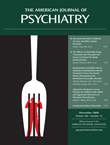Drs. Fisher and Vinogradov Reply
To the Editor: We thank Dr. Van den Noort et al. for their interest in our article. They note that “there was a difference in the number of female subjects between the treatment and comparison groups,” possibly influencing our results, and there seems to “have been a substantial difference between the two groups regarding the dose of antipsychotic medication, with the comparison group receiving higher doses.”
To determine whether gender and chlorpromazine levels significantly influenced these results, we analyzed the data using repeated-measures analysis of variance with the addition of these variables as covariates. Relative to the comparison group, the treatment group showed significant gains from baseline to post-training in global cognition (F=14.05, df=1, 51, p<0.001), verbal working memory (F=5.08, df=1, 51, p=0.03), verbal learning (F=9.47, df=1, 51, p=0.003), and verbal memory (F=8.26, df=1, 51, p=0.006). Thus, our results remained the same.



